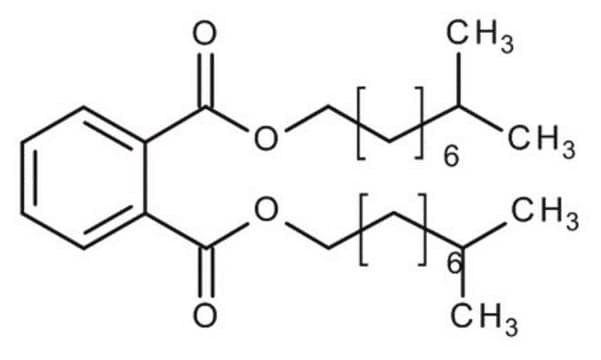80135
Diisodecyl phthalate
Selectophore™, ≥99.0%
About This Item
Productos recomendados
grado
for ion-selective electrodes
Nivel de calidad
Línea del producto
Selectophore™
Análisis
≥99.0% (sum of isomers, GC)
≥99.0%
formulario
liquid
índice de refracción
n20/D 1.486
densidad
0.965 g/mL at 20 °C (lit.)
cadena SMILES
O=C(OCCCCCCCC(C)C)C1=C(C(OCCCCCCCC(C)C)=O)C=CC=C1
InChI
1S/C28H46O4/c1-23(2)17-11-7-5-9-15-21-31-27(29)25-19-13-14-20-26(25)28(30)32-22-16-10-6-8-12-18-24(3)4/h13-14,19-20,23-24H,5-12,15-18,21-22H2,1-4H3
Clave InChI
ZVFDTKUVRCTHQE-UHFFFAOYSA-N
¿Está buscando productos similares? Visita Guía de comparación de productos
Categorías relacionadas
Descripción general
Aplicación
Información legal
Frases de peligro
Consejos de prudencia
Clasificaciones de peligro
Aquatic Chronic 4
Código de clase de almacenamiento
10 - Combustible liquids
Clase de riesgo para el agua (WGK)
WGK 1
Punto de inflamabilidad (°F)
527.0 °F - closed cup
Punto de inflamabilidad (°C)
275.00 °C - closed cup
Equipo de protección personal
Eyeshields, Gloves
Choose from one of the most recent versions:
¿Ya tiene este producto?
Encuentre la documentación para los productos que ha comprado recientemente en la Biblioteca de documentos.
Los clientes también vieron
Nuestro equipo de científicos tiene experiencia en todas las áreas de investigación: Ciencias de la vida, Ciencia de los materiales, Síntesis química, Cromatografía, Analítica y muchas otras.
Póngase en contacto con el Servicio técnico







